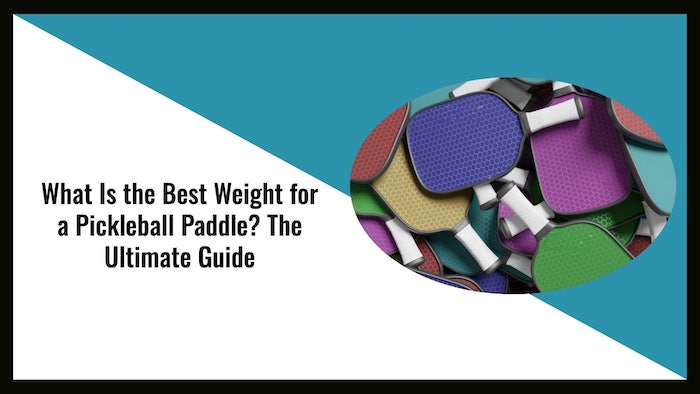Calling all pickleball enthusiasts and newcomers alike! Are you ready to serve up some serious fun on the pickleball court? Well, hold on to your paddles, because we’re about to explore a crucial aspect of the game that can make or break your performance – pickleball paddle weight!
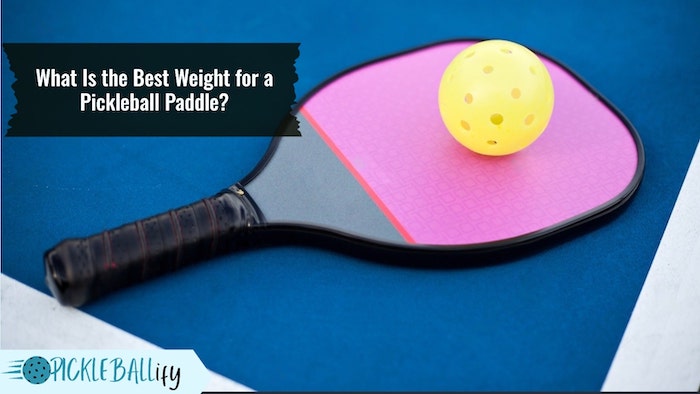
That’s right, the weight of your paddle can significantly impact your game, and we’re here to help you understand what weight is best for you. Whether you’re a pickleball pro or just starting out, knowing the right paddle weight can be a game-changer.
So, let’s dig into this juicy topic and uncover the secrets to finding the perfect pickleball paddle weight that will have you dinking, smashing, and winning like a champ! Get ready to pickle up some valuable insights, and let’s get this pickleball party started!
Why Pickleball Paddle Weight Matters
The weight of the pickleball paddle matters because it affects your play in several ways:
- Performance – The weight of the paddle affects how much force and control you have over your shots. A heavier paddle will better drive the ball, while a lighter paddle will provide you with greater control over the ball. A heavier paddle also allows you to hit deeper serves and returns, while a lighter paddle allows you to play more precise drop shots and dinks.
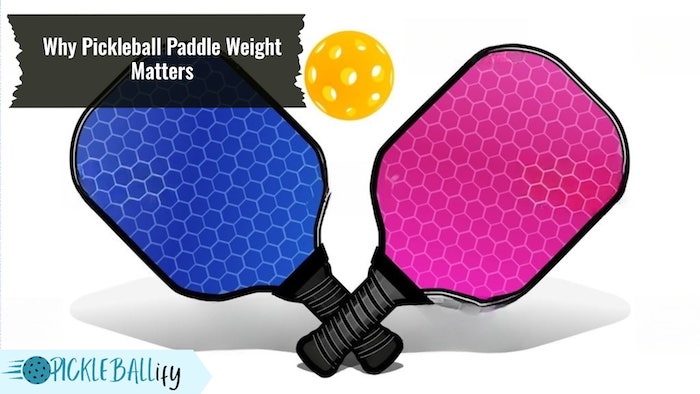
- Speed – The weight of the paddle influences how quickly you can swing and respond with it. A lighter paddle allows you to swing faster and respond faster at the net, but a heavier paddle requires more effort and time to swing and move.
In addition, a lighter paddle can help you prevent weariness and injury throughout extended bouts, but a heavier paddle will tire you out sooner.
- Comfort – When playing pickleball, the weight of the paddle influences how comfortable you are. A lighter paddle will lessen tension and vibration in your arm, elbow, and shoulder, but a heavier paddle will produce more strain and pain. A lighter paddle will be simpler to grip and maneuver, but a heavier paddle will be more difficult to hold and balance.
Pickleball Paddle Weight Categories
Pickleball paddles come in three main weight categories: lightweight, mid-weight, and heavyweight. Each category has its own advantages and disadvantages, depending on your play style and preference. Here is a brief overview of each category:
Lightweight Pickleball Paddles
Pickleball paddles that weigh less than 7.3 ounces are considered lightweight. They are best suited to players that prefer control, delicacy, and quickness above power. Lightweight paddles enable you to swing faster and respond faster, giving you an advantage in fast-paced rallies and volleys. They are also gentler on your arm and shoulder, causing less tiredness and tension.
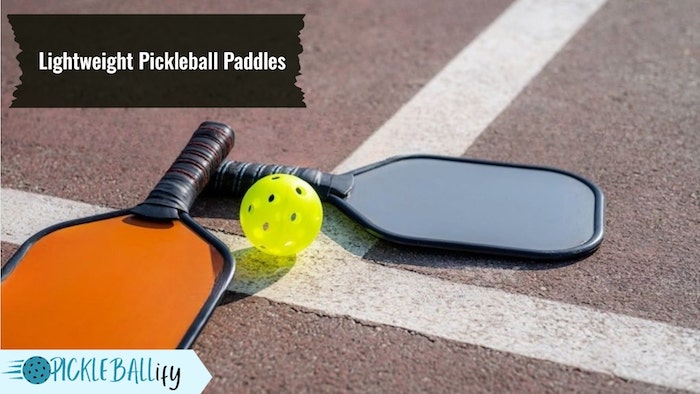
However, lightweight paddles have several disadvantages. They provide less power and drive, requiring you to use more energy from your arm to smash the ball harder. They also vibrate more while striking the ball, which can be uncomfortable or even cause damage if you have a sensitive elbow or wrist.
Players that like to play dinks, drop shots, and soft strokes that demand greater touch and precision choose lightweight paddles. They are also appropriate for players with a quick and wristy swing, or who have a ping-pong or racquetball experience. Lightweight paddles are also ideal for novices who want to learn the fundamentals of pickleball without putting too much pressure on their arm.
Pros
- More control and finesse
- Faster swing speed and reaction time
- Less arm fatigue and stress
- Good for dink lovers and touch players
- Good for beginners and players with fast swings
Cons
- Less power and drive
- More arm forces required
- More vibration and potential injury
- Not good for power hitters and aggressive players
Mid-Weight Pickleball Paddles
Pickleball paddles weighing between 7.3 and 8.3 ounces are considered mid-weight. Because they provide an excellent combination of power and control, they are the most popular and adaptable weight category for pickleball paddles. Mid-weight paddles provide enough force and drive to smash the ball strongly, but also enough control and touch to precisely position the ball.
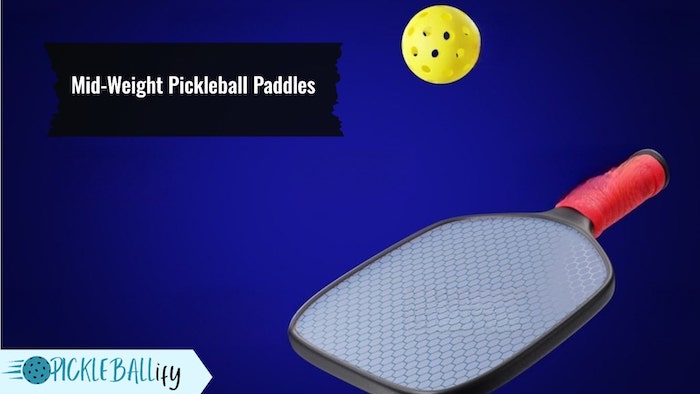
Mid-weight paddles are also more comfortable and easier to use than lightweight paddles since they create less vibration and tension, but also less weariness and strain than heavy paddles. They are appropriate for players of all skill levels and playing styles since they can adjust to a variety of scenarios and shots.
Mid-weight paddles, however, have several limits. They may not give enough power for certain players who want to smash the ball very hard or enough control for those who prefer to play very delicate strokes. They may also be slower and less responsive than lightweight paddles, as well as less steady and robust than heavy paddles.
Players who enjoy a balanced game of power and control, or who wish to move between different shots depending on the scenario, favor mid-weight paddles. They are particularly appropriate for players who have tennis elbow or other arm ailments since they create less impact and stress than other weight categories. Mid-weight paddles are also ideal for tennis players since they require less wrist motion to create force.
Pros
- Good balance of power and control
- Comfortable and easy to use
- Less vibration and stress than lightweight paddles
- Less fatigue and strain than heavy paddles
- Good for balanced players and all skill levels
Cons
- Not enough power for some players
- Not enough control for some players
- Not as fast or responsive as lightweight paddles
- Not as stable or solid as heavy paddles
Heavy Weight Pickleball Paddles
Pickleball paddles weighing more than 8.3 ounces are considered heavy weights. They are best suited to players who prefer power, drive, and stability above control, finesse, and speed. Heavy-weight paddles can generate greater power and momentum when striking the ball, resulting in harder and deeper strokes.
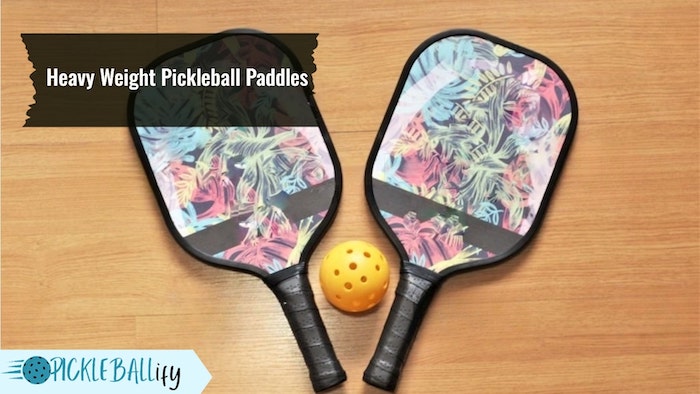
Heavy-weight paddles are also more durable and solid when striking the ball, causing less vibration and deflection. They can also absorb more shock from ball impact, reducing strain on your arm and elbow.
However, heavier-weight paddles have significant drawbacks. They are slower and less sensitive than lighter paddles, affecting your response time and accuracy. They also create additional arm and shoulder fatigue and strain, especially if you play for lengthy periods of time.
Players that want to play aggressively and smash the ball forcefully, or who wish to dominate their opponents with powerful shots, favor heavy-weight paddles. They are also appropriate for players with a strong arm and shoulder, as well as a slow and smooth swing. Heavy-weight paddles are particularly beneficial for players who play outside in windy situations since they can withstand the wind better than lighter paddles.
Pros
- More power and drive
- More stability and solidity
- Less vibration and stress
- Good for power hitters and aggressive players
- Good for outdoor and windy conditions
Cons
- Less control and finesse
- Slower swing speed and reaction time
- More fatigue and strain
- Not good for dink lovers and touch players
- Not good for indoor and calm conditions
How to Choose the Best Weight for Your Pickleball Paddle
As you can see, there is no one-size-fits-all answer to what is the best weight for a pickleball paddle. The best weight for you depends on several factors, such as your playing style, skill level, physical condition, personal preference, and comfort.
To help you choose the best weight for your paddle, here are some tips and guidelines to consider:
1) Try different weights before you buy – The easiest approach to figure out what weight works best for you is to experiment with different paddle weights and observe how they feel on your hand and arm.
You can borrow paddles from friends or club members, or you can go to a local business that allows you to test paddles before purchasing them. Consider how each paddle influences your swing speed, response time, power, control, accuracy, comfort, and tiredness.
If you have arthritis, “tennis elbow” or an injury to your hand, elbow or shoulder, we recommend you select a middle-weight paddle between 7.3 and 8.4 ounces.” suggested by Annapolis Pickleball.
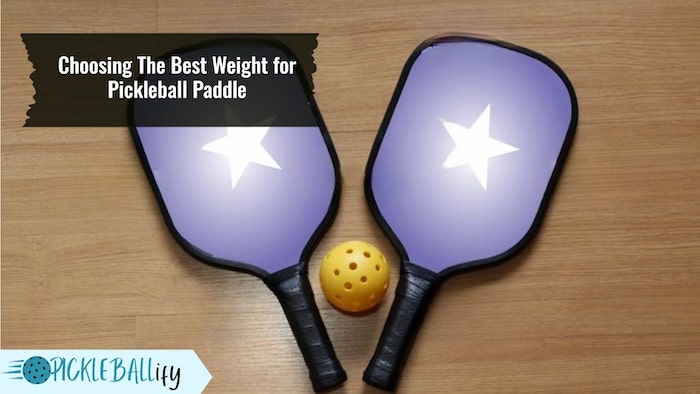
2) Consider your playing style – Consider what types of shots you like to play the most and what types of shots you wish to improve on. A lightweight paddle may be preferable for you if you like to play dinks, drop shots, soft strokes, or other shots that demand more control and delicacy.
A heavy-weight paddle may be preferable for you if you like to play serves, returns, smashes, drives, or other strokes that demand more force and drive.
A mid-weight paddle may be preferable for you if you want to play a balanced game of power and control, or if you like to transition between different shots depending on the scenario.
3) Consider your skill level – Consider how much pickleball experience you have and how confident you are in your abilities. A lightweight or mid-weight paddle may be preferable for you if you are a novice or intermediate player who is still learning the basics of pickleball or developing your technique.
Because they provide better control and responsiveness, these paddles can help you develop your talents more quickly and easily. A heavy-weight paddle may be beneficial for you if you are an expert or pro player who has mastered the principles of pickleball or has a perfect technique.
Because they provide more power and stability, these paddles can help you improve your performance and challenge your opponents more effectively.
4) Consider your physical condition – Consider your arm and shoulder strength, as well as whether you are prone to injuries or tiredness. If you have a weak or damaged arm or shoulder, or if you have tennis elbow or other arm problems, you should avoid using paddles that are excessively heavy or too light for you.
These paddles may increase the stress and impact on your arm and elbow, worsening or exacerbating your illness. Instead, select a paddle that is gentle on your arm and elbow, such as a mid-weight paddle or a paddle with a soft core or surface.
5) Consider your personal preference and comfort – Finally, the optimal weight for your paddle is the one that feels comfortable to you. You may have a particular taste for a specific weight group, or you may like a specific weight on your hand and arm.
Other aspects that may affect your decision include the size and shape of your paddle, the size and form of your grip, the core and surface materials, the colour and design, and the price and brand.
The most crucial factor is to select a paddle that you love using and that makes you feel confident and happy on the court.
FAQs
Your pickleball paddle’s appropriate weight is determined by factors such as your playing style, skill level, and physical ability. Beginners may select lighter paddles for more control, but expert players may prefer heavier paddles for greater power. It’s critical to experiment with different paddle weights to see which one feels the most comfortable and successful for your game.
Yes, using a heavier pickleball paddle can have advantages. Heavier paddles provide greater power, making them ideal for players who wish to create more speed and force in their shots. They can also help players with slower swing speeds produce greater momentum because of the weight of the paddle. However, finding a weight that you can easily manage without compromising control and accuracy is critical.
Yes, using the incorrect paddle weight might have an impact on your technique. If your paddle is excessively heavy, it may affect your swing mechanics and force you to rely on arm power too much, potentially leading to bad form and lower accuracy. If your paddle is too light, it will take more work to produce power, which will damage your timing and shot execution.
Yes, certain pickleball paddles include detachable weights that allow you to customize the total weight of the paddle. These weights may be added or removed to fine-tune the weight of the paddle to your liking. However, it is critical to examine the rules and regulations of the pickleball organization with which you play, since some may limit the use of adjustable-weight paddles.
Final Thoughts
In conclusion, the weight of your pickleball paddle plays a significant role in your game performance. Finding the right weight that suits your playing style, skill level, and physical abilities is crucial for optimal gameplay.
Heavier paddles offer more power, while lighter paddles provide more control and maneuverability. It’s important to consider other factors such as grip size, material, shape, and balance point in conjunction with the weight when choosing a pickleball paddle.
Trying out different paddle weights and seeking input from other players or professionals can be helpful, but ultimately, finding the best weight for your paddle requires personal experimentation and preference.
So, take the time to test and find the perfect weight for your pickleball paddle, and watch your game improve as a result!

